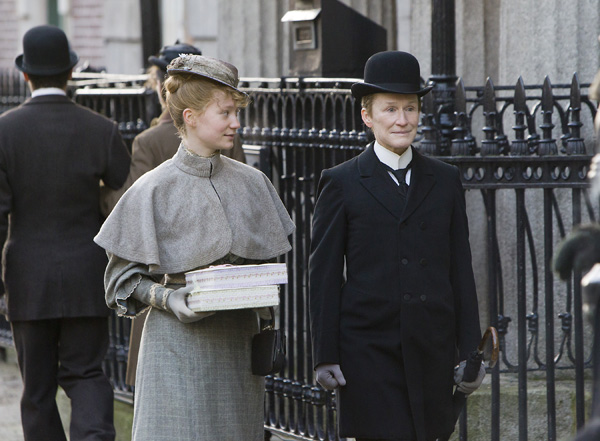
Mia Wasikowska and Glenn Close in ALBERT NOBBS (Patrick Redmond/Roadside Attractions)
Albert Nobbs is a small movie in every way. That’s not to say it’s not good, because it is, terrifically so, but it is about a person with small ambitions, living a very small life.
Albert (Glenn Close), a waiter at a successful, but somewhat dodgy, 19th century Dublin hotel, has been keeping a secret hidden from everyone for most of his life—he is actually a she. His identity is accidentally found out by a colleague, Hubert Page (Janet McTeer), and to Albert’s shock, he (Albert always identifies himself as male) discovers Hubert, too, is a woman pretending to be a man. For both, economic independence is one reason for the disguise. But unlike Albert, Hubert is much more fully realized—he has a private life and business of his own, while married to a wife with a small cottage by the sea. Seeing this example, Albert begins for the first time in his life to dream, to want, and to work towards the goal of independence. Unfortunately, the aphorism “too little, too late” applies to Albert and his endeavors.
Close is marvelous as Albert, with a strong supporting cast, including Brendan Gleeson, as a lodger at the hotel, and Mia Wasikowska, as the chambermaid whom Albert mistakenly pins his hopes on. Aaron Johnson does what he can as Joe, the hotel handyman and lover of Helen. Johnson’s character is the only one that seems underdeveloped, swinging from determination to callowness, adrift from scene to scene. You wonder what Wasikowska’s character is doing with such a man. The actress and her character far outshine Johnson and his Joe in their scenes together.
Though the script at times can be predictably pedestrian, Close overcomes it. Albert is extremely timid, and one feels that the character study sometimes might work better in the short story that’s the source for the film. It’s not easy to pry into Albert’s thoughts without the aid of a narrator, and Albert’s various voice-overs do not overcome this obstacle. Nonetheless, Close steals the movie, and McTeer steals it right back. As the charismatic Hubert, McTeer brings a sensitive counterpoint to Close’s timid Albert. With cropped, slicked-back hair and a pale, paper-like face, Albert is a faded being, living on the fringes of life. Only with Hubert does he start to grasp at what it means to be human.
Yet not everyone is meant to reach fulfillment, if only due to lack of time. Life, and the movie, gently but inexorably pulls Albert back into her assumed guise. Happiness is allowed to her, but only briefly. When Albert and Hubert dress on a whim in women’s clothes, they take a walk on the beach. Albert—caught up in the moment—starts to run, only to quickly trip and fall. It is the precursor to the inevitable, mundane, and tragic end to a character who cannot even remember her/his original name. She has been so fully absorbed by Albert that she cannot find her way out of the box she has trapped herself in, even though she finally senses her confinement.






Leave A Comment